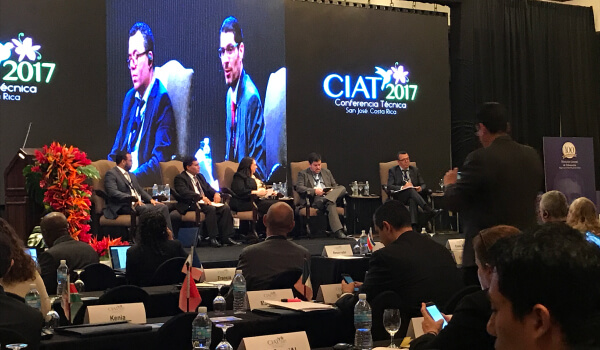Three brief accounts of a great Conference (Tuesday)

(….)
Tuesday’s activities began with a set of lectures on the benefits of multilateralism in which Deepak Tiwary of India detailed the various mechanisms existing in that country to prevent and resolve tax conflicts, such as the “tax rulings“, the rules of “safe harbor” or the APAs, whose ultimate purpose is to grant legal certainty to taxpayers and also to the tax administration. The representative of Canada Alexandra Maclean emphasized the importance of training in the field of risk analysis and the need to have the different stakeholders interested in the implementation processes of the country-by-country report which, in any case, require of a strong and meticulous planning to successfully cope with the changes that are occurring, which should also be re-evaluated in 2020.
For his part, Teodore Setzer of USA highlighted the advantages of the Mutual Agreement Procedure in the framework of Action 14 of the BEPS project, which aims to increase legal certainty, safety and transparency as essential elements for promoting investments and supporting voluntary compliance. The key words, in his view, are: “anticipate the conflict” and “transparency to change behaviors“. The representative of Portugal Luis Coelho Ramos detailed his country’s experience in relation to the Previous Agreements on Transfer Pricing as an opportunity to anticipate the conflict in such a complex matter as this one, which also involves different tax administrations and taxpayers. These agreements make possible to reduce compliance costs and facilitate improvement in the knowledge and understanding of business operations. Víctor Villalon I dedicated the presentation of Chile to explain the risk management model implemented in this country in relation to the tax intermediaries involved within the framework of the JITSIC network to identify and evaluate risks, in order to take measures, control or audit as well as collaboration and assistance, depending on the risk identified. Continuing with the national experiences, Cecilia Rico of Colombia insisted on the importance of the exchange of information with tax relevance, both automatic and on request, revealed as an essential element to improve the tax compliance and increases the collection. For the efficient use of this information, we need legal, operational and technological tools that strengthen the network analysis to improve control actions and they must focus on attacking “structures” beyond taxpayers or entities.
From the intervention of Costa Rica, a series of presentations was initiated to expose the experiences in terms of cooperation. Carlos Vargas explained the process that led to organize in his country an experience on “Tax Inspectors Without Borders” in cooperation with the Spanish tax agency that for four weeks has developed an action of strengthening and technical assistance in the field of control over transfer pricing covering both the selection, the risk analysis and the control of large and regional taxpayers. Farid Hasnaoui, representative of Morocco, – the most recent member country of CIAT – explained how his administration contributes to building capacities through participation in international and regional organizations in matters of international taxation under the inspiring principle that cooperation is not an option…it is an obligation.
For his part, the director of the Tax Agency of Spain, Santiago Menéndez corroborated the exhibit of the representative of Costa Rica and presented the long list of cooperation and technical assistance carried out by Spain (Cuba, Nicaragua, Panama, Peru…) as examples that accredit a desire for mutual benefits. He stressed how these assistances are carried out in the framework of a regulated and organized process that allows achieving a greater effectiveness in a fundamental matter for the Spanish tax administration, such as the cooperation with other tax administrations.
Tuesday afternoon session concluded with a round table to address different perspectives and experiences in the region regarding tax control of transfer pricing. It was revealed how the differences in this matter are more evident in the interpretation and implementation of the standard rather than in the design of the norm itself, noting that developing countries require support and assistance to accompany the audit and control processes in which difficulties arise, such as the relationship of the internal legislation to the OECD guidelines or the enormous difficulties in finding comparisons in the region. There was consensus that the lack or shortage of information is being dealt with through better exchanges, with greater information obligations and with a well-designed and exemplary sanctioning regime. It was advised, as a very effective measure, to try to know the trades and operations of the business activities, concluding that it is necessary to adapt the actions of the auditing agencies to an adequate management of the risk analysis in the framework of a planned and thorough process that allows to conclude well-founded and motivated audits.
And at this point, we reach the third or last day…
1,590 total views, 7 views today
